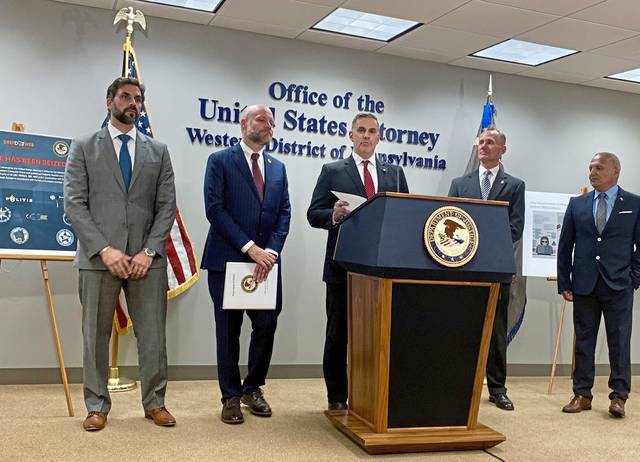https://mirror.triblive.com/local/westmoreland/carnegie-mellon-professor-will-dive-into-the-dark-web-in-murrysville/
Carnegie Mellon professor will dive into the ‘dark web’ in Murrysville

For most, the phrase “the dark web” conjures up images of hackers hunched over their computers in a darkened room, making illegal transactions or worse.
Officials from the local U.S. Attorney’s office announced the prosecution of two Israeli citizens in May who were charged with facilitating the sale of drugs and guns via the “dark web.”
But more often than not, the vast majority of material contained in the dark web is pretty benign and probably boring: internal company websites for things like payroll, unlisted social-media pages or your printer configuration page.
According to Carnegie Mellon University professor Nicolas Christin, the dark web is simply “all the pages that cannot be found by search engines. The overwhelming majority of the ‘deep web’ is completely benign.”
Christin will be the featured speaker at the Oct. 10 meeting of the American Association of University Women’s Murrysville chapter. The meeting will be at 9:30 a.m. at the Murrysville Commmunity Library at 4130 Sardis Road.
Christin spoke with the Trib recently about the deep (or dark, or anonymous) web and its use for a wide variety of applications, some of which happen to be illegal.
Q: What is ‘the dark web’?
A: The “dark web” is a bit of a misnomer. People talking about it typically refer to the “anonymous web” which is a very small part of the Internet. The anonymous web is a small part of the deep web. These are pages that require special software to be accessed. This is essentially what people refer to as “dark web,” although the term encompasses certain pages that are simply protected by logins.
The anonymous web contains services like Secure Drop that news organizations have been using to receive anonymous tips, forums for people who want to converse anonymously (e.g., victims of abuse), and, also, unfortunately, markets in which people exchange illicit goods.
Q: A lot of times the dark web makes the news in a negative way, because of the things people post or the types of “businesses” that operate there, but is there also a positive side to the dark web?
A: Yes. This is why I am unsure about the term “dark” web, which has some sinister connotations. Anonymity has some truly beneficial uses – the ability for whistle-blowers to report abuse, for people to give anonymous tips, in particular, shouldn’t be understated.
More generally, in a time where every single one of our online moves appears to be tracked, primarily for economic reasons, we are starting to see the pendulum swing back in terms of perceptions of anonymity. People seem to increasingly appreciate the fact that online anonymity does help with privacy, to be taken here as the “right to be left alone,” to quote (Supreme Court) Justice (Louis) Brandeis.
Q: You spent eight years monitoring “anonymous marketplaces” on the dark web — what is an “anonymous marketplace” and why would someone want to set up such a business?
A: An anonymous marketplace is very much like a typical electronic commerce marketplace — think Amazon, eBay, and so forth. The only, and key difference, is that all participants (sellers, buyers, market operator), are anonymous to each other and to external observers. That is all there is to it. Unfortunately, the anonymity guarantees provided make it also possible for people to engage in illicit commerce.
Q: How do people access the anonymous web?
A: Most of the anonymous web can be accessed using special-purpose software. The Tor browser bundle (Tor.eff.org) is perhaps the best-known piece of software. It gives people the ability to conceal the IP address (a connection identifier not too dissimilar to a phone number of sorts) of their computer when browsing the web, which in turn provides some anonymity. More to the point here, it also allows folks to communicate with servers whose own IP addresses are hidden.
Q: What do you hope to convey to attendees at the Oct. 10 presentation in Murrysville?
A: I think the main highlights are that 1) the dark web is actually not particularly concealed — in fact, a lot of these markets are very easy to access and are quite open; 2) there is a real, functioning economy on the dark web; even though a lot of it is for illicit goods, economic fundamentals aren’t particularly different. The ecosystem is surprisingly similar to what we would expect from regular e-commerce markets: whenever there is demand, enterprising individuals will attempt to provide the supply side.
